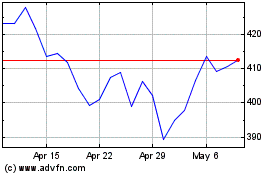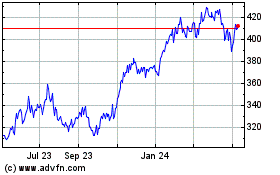By Michael Wursthorn
This article is being republished as part of our daily
reproduction of WSJ.com articles that also appeared in the U.S.
print edition of The Wall Street Journal (July 9, 2018).
U.S. companies are buying back record amounts of stock this
year, but their shares aren't getting the boost they bargained
for.
S&P 500 companies are on track to repurchase as much as $800
billion in stock this year, a record that would eclipse 2007's
buyback bonanza. Among the biggest buyers are companies like Oracle
Corp., Bank of America Corp. and JPMorgan Chase & Co.
But 57% of the more than 350 companies in the S&P 500 that
bought back shares so far this year are trailing the index's 3.2%
increase. That is the highest percentage of companies to fall short
of the benchmark's gain since the onset of the financial crisis in
2008, according to a Wall Street Journal analysis of share buyback
and performance data from FactSet.
And the historic spending spree on share buybacks has some
analysts worried companies are buying their shares at excessive
valuations during the peak of the economic cycle and at a time when
the market rally is nine years old. Others warn the billions of
dollars spent to buy back shares could have gone toward capital
improvements like new factories or technology that could lead to
stronger long-term growth.
"There has been less of a reward for companies engaging in new
buybacks over the last 18 months," said Kate Moore, chief equity
strategist and a managing director at asset-management firm
BlackRock Inc. "It's fair for investors to ask whether companies
are buying at the right point."
The S&P 500 Buyback index, which tracks the share
performance of the 100 biggest stock repurchasers, has gained just
1.3% this year, well underperforming the S&P 500.
Share buybacks have become corporate America's go-to strategy
for boosting stock prices and earnings over the past 30 years. The
point of buybacks is to try to make a company's stock more
valuable. By mopping up shares, a company shrinks the stock pie,
which boosts earnings per share. That, in turn, should push the
share price higher.
The potential problem: Executives directing buybacks are
essentially timing the market, and often they end up buying
high.
Buyback activity reached a frenzy in the early 2000s; the
previous record for share repurchases was $589.1 billion in 2007.
But that was just a year before the stock market tumbled into the
worst financial crisis since the Great Depression. The result:
companies like Exxon Mobil Corp., Microsoft Corp. and International
Business Machine Corp. each paid more than $18 billion to
repurchase stock at a peak, only to see their share prices slump a
year later.
Stock buybacks appear just as ill-timed now, some analysts and
investors say, especially as companies ramp up spending after last
year's $1.5 trillion tax overhaul put extra cash in their
coffers.
Oracle has been one of the biggest buyers of its own stock in
recent years and spent $11.8 billion on stock repurchases last
year, when shares gained nearly 23%. But that gamble hasn't looked
smart this year as the networking-device maker has struggled
alongside the broader market, pulling its shares down 6%.
Still, Oracle's board approved a fresh round of share buybacks
totaling $12 billion in February, and executives appear to have
spent nearly half that sum already. A representative from Oracle
declined to comment on its share buyback program, but the company
said in a recent Securities and Exchange Commission filing that it
"cannot guarantee" its share repurchase "will enhance long-term
stockholder value."
Others like McDonald's Corp., Bank of America and JPMorgan Chase
have spent billions on share repurchases this year, but haven't
seen a short-term bounce in share prices. McDonald's bought back
$1.6 billion of shares in the first quarter, but the fast-food
chain's stock is down 7.4% this year. Bank of America and JPMorgan
Chase have both spent more than $4.5 billion to buy back their
shares, which are down 5% and 2.7%, respectively.
All three companies also spent multibillion-dollar sums on
buybacks in 2017 as the stock market hit repeated highs.
Companies in the S&P 500 that have repurchased shares are
expected to see a return on investment of about 6.4% this year, a
percentage that falls below the past six rolling five-year periods
as measured by Fortuna Advisors, a financial consulting firm that
has examined buyback trends going back to 2007.
Returns on investment for buybacks peaked in 2013, according to
Fortuna's analysis, as companies used share repurchases to boost
earnings and dig themselves out of the depths of the financial
crisis. With stock prices relatively low at the time and economic
activity tepid, share buybacks were one of companies' key sources
of earnings growth.
But even as the stock market steadied in the subsequent years
and economic growth around the world picked up to help boost
profits, corporate executives continued to spend wildly on share
repurchases -- often at the expense of other types of spending,
including dividends and capital improvements. Spending on capital
expenditures rose to $166 billion in the first quarter, up 24% from
a year earlier, according to Credit Suisse, but still well below
the $189 billion spent on buybacks.
"The majority of capital deployed is going right back to
shareholders and not reinvestment in businesses," said Gregory
Milano, chief executive at Fortuna. "If that's the only thing
you're relying on, it's going to end badly."
Some share buybacks do pay off, but that tends to be among
companies that show a high level of sales and earnings growth on
their own, analysts say. Apple Inc., for example, has bought back
$22.8 billion worth of stock so far this year. Its shares have
risen 11%, with much of the boost coming after it reported strong
gains in second-fiscal-quarter revenue and profit -- as well as a
record $100 billion plan to buy back more stock.
"Corporate America has such an obsession with bottom-line
growth," said Jay Bowen, president of Bowen Hanes & Co.,
manager of the $2 billion Tampa Firefighters and Police Officers
Pension Fund. "Long term, I don't like it."
Write to Michael Wursthorn at Michael.Wursthorn@wsj.com
(END) Dow Jones Newswires
July 09, 2018 02:47 ET (06:47 GMT)
Copyright (c) 2018 Dow Jones & Company, Inc.
Microsoft (NASDAQ:MSFT)
Historical Stock Chart
From Mar 2024 to Apr 2024

Microsoft (NASDAQ:MSFT)
Historical Stock Chart
From Apr 2023 to Apr 2024
